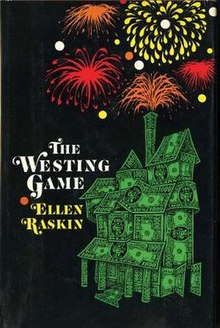Senseless, you say? Death is senseless yet makes way for the living. Life, too, is senseless unless you know who you are, what you want, and which way the wind blows.
So on with the game. The solution is simple if you know whom you are looking for. But heirs, beware! Be aware!
Some are not who they say they are, and some are not who they seem to be. Whoever you are, it's time to go home.
God bless you all and remember this:
Buy Westing Paper Products!
I swear, when I saw the first trailer for Rian Johnson's movie Knives Out, I thought: Somebody made a movie of The Westing Game! The cast of colorful characters, gathered in a single place, to solve the mystery of a murder--I know those aren't exactly original tropes but something about the color and tone of the film made me think of Ellen Raskin's young adult mystery, which I haven't thought about in years. And so I had to go reread it to see if it was as fun and well-plotted as I remember.
The story is this: several strangers are sold apartments in a brand new building overlooking Lake Michigan. They include impetuous pre-teen Turtle Wexler, her beautiful sister Angela, their selfish parents Jake and Grace; Shin Hoo, who runs a Chinese restaurant on the top floor, his wife and teenage son; the Theotorakis brothers, one of whom is whipsmart but has a debilitating palsy; J. J. Ford, a black woman judge; a pious old woman named Crow. In addition to these, the apartment building is staffed by a vulgar doorman named Sandy McSouthers and serviced by a genial, slightly idiotic deliveryman named Otis Amber. When the mysterious paper magnate Samuel Westing, whom everyone thought absconded overseas, is murdered in his nearby mansion, the denizens of the apartment building are invited to a will reading and compelled to put together a devious puzzle in hopes of inheriting Westing's fortune.
In my memory, the mystery is extremely satisfying, a multi-layered marvel of clockwork plotting. Rereading, I didn't really find that to be the case. The "puzzle" that Westing leaves is mostly very simple: the residents are paired, seemingly at random, and given an envelope containing words. The words (as an adult reader will quickly find obvious) are the lyrics to "America the Beautiful," and the secret at the heart of the mystery is found in the words that are missing.
What is really satisfying is the myriad ways in which all the teams wrongly approach the mystery. the team with the word "Amber" focuses on Otis Amber, of course; Turtle and her partner, a kindly old woman named Flora, actually believe their words are stock symbols and make investments. What sets The Westing Game apart from similar mysteries is the elegance not of the right solution but of the wrong ones. The one right strategy, which is of course impossible, given the residents' greed and petty divisions, is to pool the clues. If they can only bring themselves to pool the clues and the reward the mystery would be revealed instantly.
The Westing Game is an allegory. The residents of the Westing Towers are America, in miniature. It's no coincidence that the song in the clues is "America the Beautiful," or that Westing is dressed up like Uncle Sam in his coffin. The divisions between them are divisions of race and class made miniature; if only, like America, they could put aside their differences, they'd reap a rich reward. (A more jaundiced take might be this: The Westing Game asks us to believe in a both-sides ideology, in which a struggling immigrant like Shin Hoo is equally culpable for the nation's problems as rich, vain Grace Wexler, and for a solution it gives us a condescending Bloomberg-type billionaire who promises to bring us all together!) It's cringey at times (I'm not a huge fan of J. J. Ford showing up for the climax in "African robes"), but on a PBS level, it pretty much works.


No comments:
Post a Comment